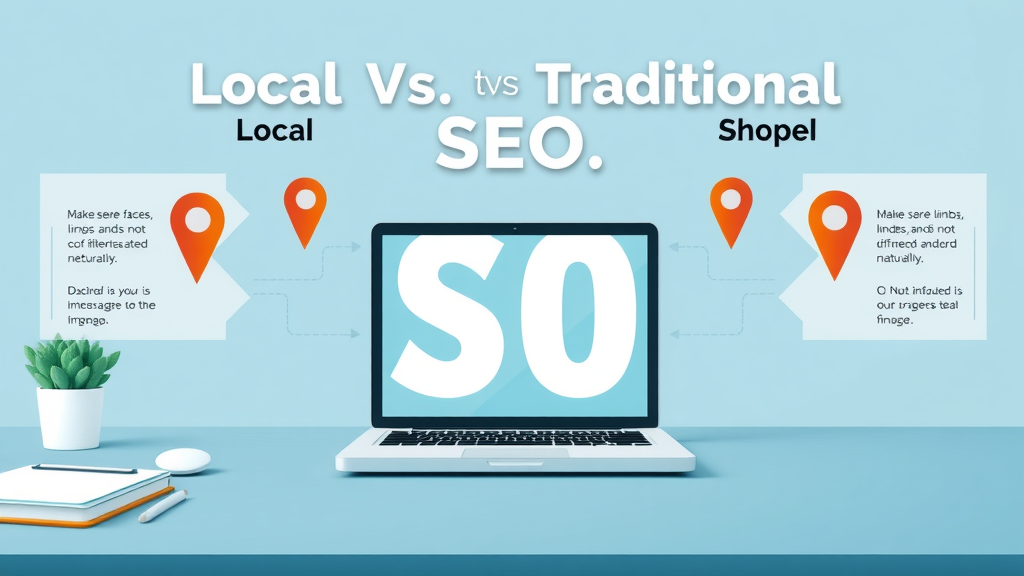Did you know that nearly 8 out of 10 local mobile searches end in a purchase—often within 24 hours? For small businesses eager to attract a steady flow of nearby customers, harnessing the power of local SEO is no longer optional—it’s essential. This comprehensive guide will uncover proven strategies to get your small business ranking higher in search engines, connecting you to the community right outside your door. Read on to discover how to grow your local customer base and transform your business’s digital footprint starting today.
Why Local SEO for Small Businesses Matters: Unveiling the Local Search Advantage
If you’re running a small business, attracting nearby customers who are ready to buy can make the difference between thriving and just surviving. Local SEO for small businesses ensures that your business is seen by people searching for your services in your immediate area. When people search Google for “coffee near me” or “best plumber in [your city],” well-optimized local businesses have the best chance of showing up on top. A strong local ranking increases the likelihood your business will be picked over bigger, non-local competitors.
Unlike broad SEO strategies aimed at ranking nationally or internationally, focusing on local SEO puts your business right where it matters most—on the screens of nearby potential customers. By optimizing your website and online profiles for local search, you effectively position your brand as the go-to solution within your community. This approach not only helps you dominate local search results but also builds trust, reputation, and authority where it counts.

"78% of local mobile searches result in an offline purchase. This staggering statistic demonstrates that mastering local SEO for small businesses can drive real, measurable revenue growth in your neighborhood."
- Connects small businesses with motivated nearby customers
- Increases visibility on search engines for local search terms
- Builds trust and authority within your community
Understanding the Difference: Local SEO vs Traditional Search Engine Optimization for Small Businesses
Traditional search engine optimization (SEO) targets ranking for keywords with broad, sometimes global intent—think “best shoes” rather than “best shoe store in Denver.” Local SEO for small businesses, by contrast, is granular and geographic. It involves optimizing your digital assets to appear in local search results, such as Google Maps, Google’s Local Pack, and locally focused queries (“near me” searches).
This difference is pivotal because local businesses have an advantage when targeting users nearby. A business doesn’t need to outrank every competitor nationally—just those within a user’s service area. Features like Google Business Profile, local citations, and map results play a more important role than traditional backlinks or general content marketing. Local SEO puts your business on the map—literally and figuratively—where your future customers are searching.

"Local SEO helps local businesses dominate the search results in their immediate area, rather than competing with national or global players."
Getting Started: Essential Elements of Local SEO for Small Businesses
Laying a solid foundation for local SEO for small businesses means focusing on the critical components that search engines value most. The centerpiece of this foundation is your Google Business Profile, which acts as your business’s digital storefront in local search. Other vital factors are having accurate NAP (Name, Address, Phone Number) information, building citations across reputable directories, and actively collecting and responding to customer reviews. These steps ensure that your business information is both visible and trusted in the eyes of both Google and your customers.
Maintaining accuracy and consistency across these touchpoints is crucial. Inconsistent information can confuse customers and search engines alike, harming your chances of appearing at the top of local results. By systematically addressing each of these elements, your small business sets itself up for long-term visibility and community trust.
- Google Business Profile creation and optimization
- Accurate business information (NAP consistency)
- Building local citations and directory listings
- Encouraging and responding to customer reviews

What You'll Learn in This Guide on Local SEO for Small Businesses
- Understand the foundations of local SEO for small businesses
- Learn actionable steps for on-page and off-page local SEO
- Access data-driven strategies for achieving higher local rank and local ranking
Optimizing Your Google Business Profile: The Heart of Local SEO for Small Businesses
An optimized Google Business Profile is arguably the most powerful tool in a small business’s local SEO toolbox. This free resource puts your business information directly in Google’s Local Pack, Maps, and organic search. Completing all key fields, regularly updating your profile, and interacting with your community online can set your business apart from the competition.
Focusing on accuracy, relevant business categories, engaging photos, and timely responses to customer reviews will help improve your SEO ranking and ensure your small business is featured in local search results. Google rewards active management, so set a schedule to check and update your business profile frequently for the greatest impact.

Step-by-Step: Setting Up and Verifying Your Google Business Profile for Local Business Success
Creating and verifying your Google Business Profile is the first real step in mastering local SEO for small businesses . Begin by claiming your listing, and ensure all the business info—name, address, and phone number (NAP)—matches across all platforms. Select the most relevant business categories and thoroughly fill out attributes so Google understands exactly what you offer. Upload high-quality images showing your storefront, team, and offerings to give potential customers confidence in your local business.
Don’t forget to specify your service areas and clearly define your business hours. Completing and verifying each piece of information helps Google accurately connect you with searchers in your neighborhood—significantly increasing your visibility in local search engine results. After setup, verification via email, phone, or postcard finalizes your authority, enabling you to make ongoing updates that help bolster your local ranking.
- Name, Address, Phone Number (NAP)
- Business categories and attributes
- Images and posts
- Service areas and business hours
Maximizing Local SEO Ranking Signals in Google Business Profiles
Once your business profile is live, elevating your local rank involves more than just passive management. Encourage happy customers to leave positive reviews, and respond thoughtfully to every review—Google and future customers both notice. Use strategic keywords (like “local bakery in [city]” or “emergency plumber near me”) in your business description and service details to further tie your profile to local search intent.
Regular activity—posting updates, listing special promotions, or highlighting events—signals to Google that your business is active, relevant, and responsive to your community. Combined, these ranking signals boost your odds of appearing in the top local search results, driving more foot traffic and phone calls from potential customers.
- Collecting high-quality reviews and responding promptly
- Using keywords in your business description
- Posting regular updates to engage your local audience
Building Local Citations and Directory Listings for Small Businesses
Consistent and widespread local business citations support your local SEO efforts by confirming your business information across the digital landscape. Citations are mentions of your business’s name, address, and phone number on reputable sites and directories. These references build search engines’ confidence in your business’s legitimacy and location, which greatly impacts your local ranking.
Focusing on respected directories such as Google Business Profile, Yelp, Bing Places, Facebook, YellowPages, and industry-specific sites will yield the best results. By properly managing and updating these listings, you boost both your local search engine visibility and customer trust—proving to both Google and shoppers that your business is real, relevant, and reliable.
Top Citation Sources That Impact Local SEO for Small Businesses
| Listing | Relevance | Submission Tips |
|---|---|---|
| Google Business Profile | Critical | Must-claim and optimize |
| Yelp | High | Respond to reviews |
| Bing Places | Moderate | Sync info with Google |
| High | Add business hours and photos | |
| YellowPages | Moderate | State correct NAP |
| Industry-Specific Directories | Variable | Focus on local keywords |

How NAP Consistency Affects Local SEO for Small Businesses and Local Rank
Maintaining consistent Name, Address, and Phone Number (NAP) information across every website, directory, and social platform is critical for local SEO. This consistency signals trustworthiness to search engines like Google, which in turn helps your business rank higher in local search results. Even small differences—like listing “Street” vs. “St.”—can create confusion that weakens your local ranking and causes the search engine to doubt your information’s accuracy.
Regularly audit all your listings and use specialized tools to spot discrepancies quickly. Once inconsistencies are identified, standardize the format so that every mention of your business—across the web—matches exactly. This vigilant approach minimizes search errors and maximizes your exposure to potential customers in the local market.
- Audit your listings regularly
- Use tools to find discrepancies
- Standardize the format across platforms
Conducting Local Keyword Research for Local SEO for Small Businesses
The foundation of effective local SEO for small businesses lies in identifying and targeting the right local keywords. More than just guessing what words your customers type into Google, local keyword research leverages tools and insights to uncover the exact phrases driving conversions in your market. By focusing your efforts on high-value, local keywords, your business stands out where it counts most—in the minds and search results of ready-to-buy customers in your area.
Geo-modified keywords like “Italian restaurant in [city]” and intent-based queries like “best electrician near me” are prime opportunities. The right combination of keyword research and local focus provides a significant edge in local search engine result pages (SERPs), ensuring your website, listings, and content address the needs of your specific community.
Identifying Profitable Local Keywords for Small Businesses Using Search Engines
Start by brainstorming a list of services, products, and specialties that your small business offers along with the city or neighborhood you serve. Use keyword research tools to analyze search volume and competition for these search terms, aiming for a mix of “local intent” (e.g., “auto repair in Seattle”) and “service + near me” (“florist near me”) keywords. These geo-modified and service-specific keywords attract potential customers who are most likely to convert because they want a local solution right now.
Don’t overlook the value of competitor research; analyze which keywords local competitors are targeting and ranking for to fill in any gaps. Test search queries on search engines directly and see what “People Also Ask” or related searches appear. Prioritizing the right local keywords ensures your SEO strategy is tailored for true local ranking success.

- Geo-modified (e.g., "bakery in Brooklyn")
- Service-specific (e.g., "emergency plumber near me")
How to Apply Local Keyword Research to Boost Local Ranking and SEO Ranking
Once you’ve identified your best-performing local keywords, integrate them naturally throughout your website’s most important areas: page titles, meta descriptions, headings, and alt text for images. Create landing pages with unique content targeting specific neighborhoods or cities you serve. Integrating these phrases into blog articles, FAQs, and service pages further reinforces your local authority.
Beyond your website, make sure these local keywords appear in your Google Business Profile, directory citations, and social posts. Effective local keyword usage signals to search engines that your business is a leading solution in its location, improving both your local SEO ranking and organic traffic.
- Website metadata (titles, descriptions)
- Landing pages dedicated to specific locations
- Blog content and FAQs
On-Page Optimization Strategies for Better Local SEO for Small Businesses
Optimizing your onsite content is just as vital as managing online listings for success with local SEO for small businesses . Embedding local maps, implementing schema markup that reflects your business info, and optimizing meta tags to include city or neighborhood names provide powerful signals to search engines. These elements help Google and other search engines understand both where you operate and who your ideal customer is, enhancing your visibility in local search engine result pages.
Localized, high-quality content that goes beyond your service listings—such as customer stories, testimonials, and local event guides—encourages deeper engagement with the community while targeting additional local keywords. These efforts, paired with positive reviews and genuine business information, create an on-page experience that builds trust, credibility, and, ultimately, a better local search ranking.
- Embed maps and local schema markup
- Optimize meta tags with local business and small business details
- Utilize localized content and testimonials

How to Write Location-Based Content That Improves Local SEO Ranking for Local Businesses
Producing meaningful, location-based content is essential for climbing local SEO rankings. Start with blog posts on local events, community spotlights highlighting your business’s involvement, and stories from satisfied customers in your area. Google values fresh, hyper-relevant content tied to geographic intent, which can lead to higher visibility in local search.
For added impact, use multimedia such as photos from community events, customer videos, or interactive maps highlighting your locations and service radius. Engage local influencers or collaborate on posts about neighborhood initiatives. The more you weave authentic local context into your website and social media, the more search engines and community members see your small business as a local leader.
- Local event guides
- Customer stories from your area
- Community involvement highlights
Off-Page and Link Building Tactics for Local SEO for Small Businesses
To truly dominate local search engine results , small businesses must focus on both on-page optimization and off-page efforts. Building local backlinks from prominent community websites, local blogs, or business partners is a powerful way to signal credibility to algorithms. The trust garnered from local digital endorsements differs from general backlinks, tying your business to a specific city or neighborhood in the eyes of search engines.
Pursue partnerships with local organizations or participate in area events to earn news mentions and links. Even sponsoring local awards, charities, or schools can result in valuable local mentions and citations that amplify your presence and influence in the local market.
Earning Local Backlinks and Mentions to Strengthen Local Rank
Start building authority by engaging with the local business community—host or sponsor events, collaborate on community initiatives, and establish partnerships with other local organizations. These activities often yield digital mentions from organizers, news outlets, or business directories. Each mention and backlink not only drives referral traffic but also boosts your local SEO ranking by reinforcing your small business’s relevance in your area.
Don’t overlook local online publications or neighborhood resource lists—these are high-value sources of both backlinks and customer trust. Prioritize building relationships that result in genuine mentions, as search engines reward businesses with honest, local endorsements that consumers value, too.
- Partner with local organizations
- Host community events
- Sponsor local online publications

Leveraging Social Proof and Customer Reviews for Improved Local SEO Ranking
Social proof—especially in the form of genuine customer reviews—can be a game-changer for local SEO for small businesses. Encourage happy customers to leave reviews at the point of sale, through follow-up emails, or via your website. Respond promptly and thoughtfully to all feedback, which demonstrates both customer service and active management to search engines like Google.
Feature the best reviews on your website and social media to build trust with potential customers and increase engagement. Reviews act as an ongoing stream of fresh content and a powerful ranking factor, rounding out a strategy designed to cement your small business’s authority and visibility in local search results.
- Encourage reviews at point of sale
- Respond thoughtfully, both positive and negative
- Showcase reviews on your website

Tracking and Measuring Local SEO for Small Businesses: Metrics That Matter
Success in local SEO for small businesses is all about measurable progress. Track key metrics that directly influence your local ranking and bottom-line results. Use Google Search Console to monitor local pack impressions, track click-through rates with Google Analytics, and keep tabs on calls and direction requests via your Google Business Profile. Equally important is review volume and average ratings, which impact customer trust and SEO performance.
Pair these data points with insights from reputation management platforms to spot trends, track campaign outcomes, and make informed adjustments to your ongoing local SEO strategy. This approach ensures your business adapts proactively to changes in both consumer behavior and search engine algorithms.
| Metric | Why It Matters | Tools |
|---|---|---|
| Local Pack Impressions | Shows local visibility | Google Search Console |
| Click-through Rate (CTR) | Gauge engagement | Google Analytics |
| Calls and Direction Requests | Measures real-life leads | Google Business Profile Insights |
| Review Counts & Ratings | Affects trust & rank | Reputation platforms |
Local SEO Case Studies: Small Businesses That Achieved Top Local Ranking
Nothing illustrates the immense value of local SEO for small businesses better than real-world results. Consider a local bakery that doubled its in-store traffic after optimizing its Google Business Profile and collecting five-star reviews. Or a service-based company that saw a 150% uptick in calls simply by cleaning up and standardizing its directory citations. Even multi-location small businesses have leveraged targeted content and consistent NAP management to climb the local ranking ladder across all their sites.
These victories prove that strategic local SEO investments transform online visibility into genuine business growth. By learning from these success stories and applying their tactics, your small business can achieve similar outcomes—and possibly become a stand-out local leader in your industry.

- Local bakery increased in-store visits by 200% through Google Business Profile optimization
- Service-based company that saw a 150% growth in calls after citation clean-up
- Multi-location small business improving local rank with targeted content
Adapting Your Local SEO Strategy for Ongoing Success in Local Search
Local SEO success isn’t static—your strategy must evolve to match search engine algorithm updates, competitor moves, and shifting local market trends. Monitor online reviews, citations, and local keyword performance regularly. Invest in ongoing keyword research and reviews management to spot opportunities (and threats) early, ensuring your position atop the local search results remains secure.
- Regular algorithm updates
- Monitoring reviews and mentions
- Continuing local keyword research
"Local SEO for small businesses is never 'set and forget.' Ongoing optimization is key to maintaining your local ranking and outranking competitors."
People Also Ask: Expert Answers on Local SEO for Small Businesses
Is SEO worth it for local businesses?
- Absolutely. Local SEO for small businesses drives higher ROI by targeting customers ready to make purchases nearby. With the majority of consumers searching for local business options, SEO raises visibility and increases foot traffic.
How much should I pay for local SEO?
- Costs vary by provider and market but typical monthly investments for local SEO for small businesses range from $300 to $2000. Prioritize experienced professionals who can show proven results in local ranking improvements.
How to do SEO for local businesses?
- Start by creating a Google Business Profile, maintaining NAP consistency, collecting reviews, optimizing your website for local keywords, building local citations, and creating content relevant to your area.
Is local SEO worth it?
- Yes. Local SEO for small businesses enhances search engine visibility, helping you attract nearby customers, increase conversions, and establish a competitive edge in your community.
Frequently Asked Questions on Local SEO for Small Businesses
- 1. How long does it take to see results from local SEO for small businesses?
- 2. What are the most common mistakes local businesses make with local SEO?
- 3. How do I maintain my local ranking over time?
- 4. Can small businesses compete with big brands in local search?
Key Takeaways: Mastering Local SEO for Small Businesses

- Optimize Google Business Profile for your local business
- Build citations and maintain NAP consistency
- Create local keyword-focused content and on-page SEO
- Seek customer reviews and local backlinks
Maximize Your Reach: Take Action to Boost Local SEO for Your Small Business Today
- Begin implementing these strategies to improve your local SEO for small businesses . Schedule a free local SEO audit or consult with an expert to accelerate your local ranking growth. Don't let your small business miss out on local customers—start today!
To enhance your understanding of local SEO for small businesses, consider exploring the following resources:
- “Local SEO for Small Businesses: How to Reach Nearby Customers” ( eplatformmarketing.com )
This article delves into the importance of building local citations and managing online reviews to boost your local search rankings.
- “Local SEO Tips for Small Businesses” ( bdc.ca )
This resource provides actionable steps to set up and optimize your Google Business Profile, manage reviews on local rating sites, and localize your website to improve your local search ranking.
If you’re serious about enhancing your local SEO efforts, these resources will provide you with practical strategies to connect with nearby customers effectively.
 Add Row
Add Row  Add
Add 




Write A Comment